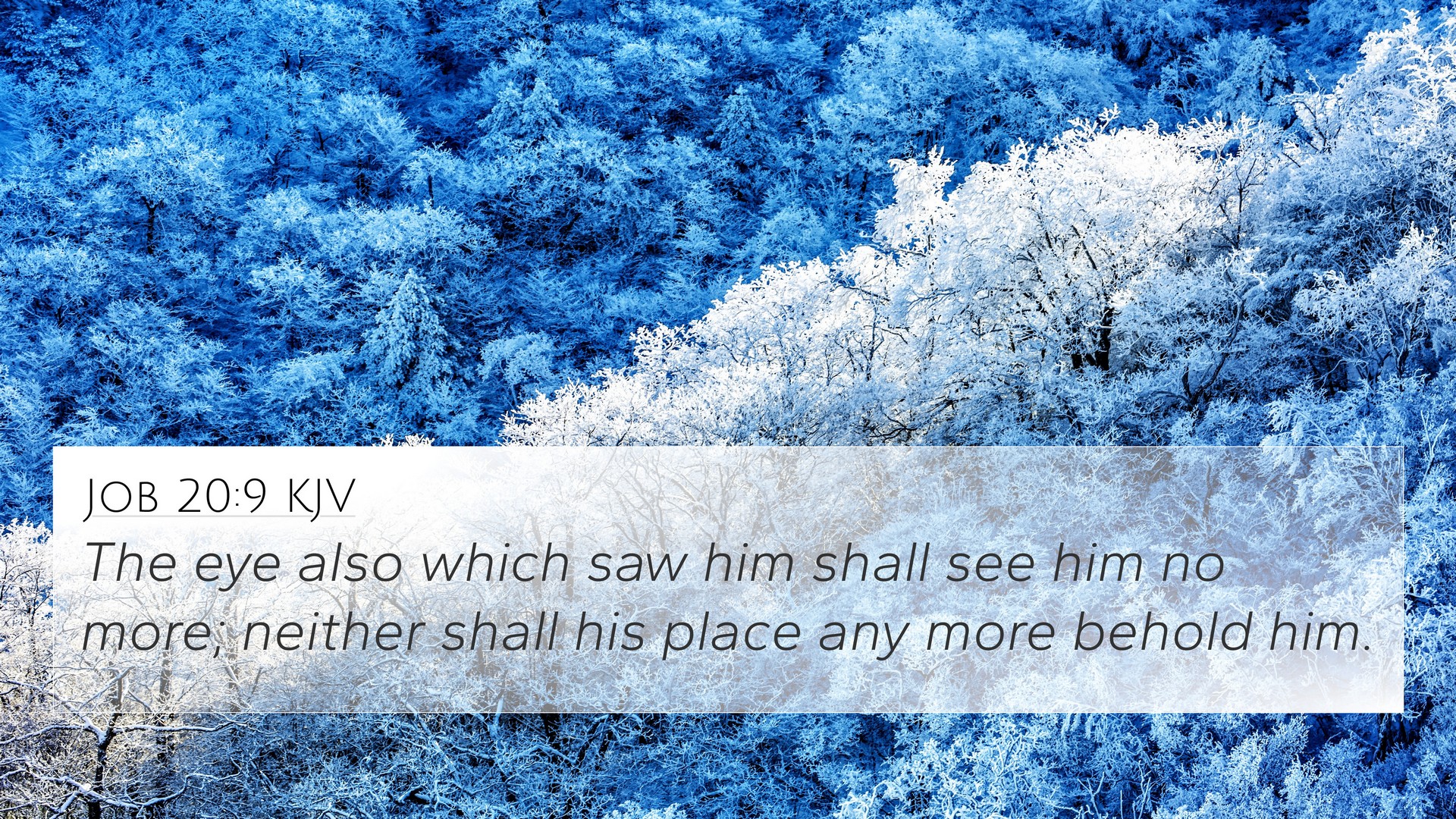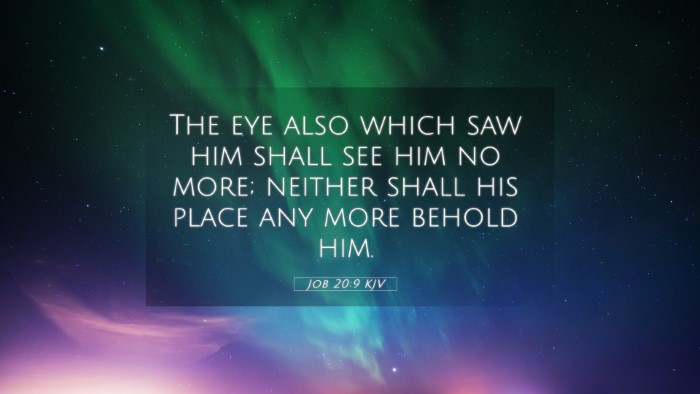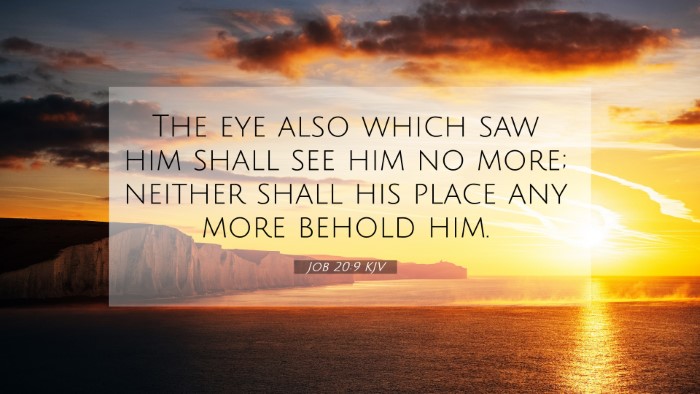Old Testament
Genesis Exodus Leviticus Numbers Deuteronomy Joshua Judges Ruth 1 Samuel 2 Samuel 1 Kings 2 Kings 1 Chronicles 2 Chronicles Ezra Nehemiah Esther Job Psalms Proverbs Ecclesiastes Song of Solomon Isaiah Jeremiah Lamentations Ezekiel Daniel Hosea Joel Amos Obadiah Jonah Micah Nahum Habakkuk Zephaniah Haggai Zechariah MalachiJob 20:9 Similar Verses
Job 20:9 Cross References
The eye also which saw him shall see him no more; neither shall his place any more behold him.
Uncover the Rich Themes and Topics of This Bible Verse
Listed below are the Bible themes associated with Job 20:9. We invite you to explore each theme to gain deeper insights into the Scriptures.
Job 20:9 Cross Reference Verses
This section features a detailed cross-reference designed to enrich your understanding of the Scriptures. Below, you will find carefully selected verses that echo the themes and teachings related to Job 20:9 KJV. Click on any image to explore detailed analyses of related Bible verses and uncover deeper theological insights.
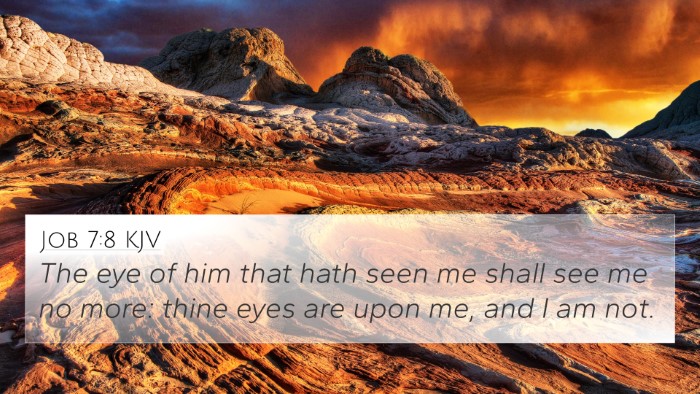
Job 7:8 (KJV) »
The eye of him that hath seen me shall see me no more: thine eyes are upon me, and I am not.
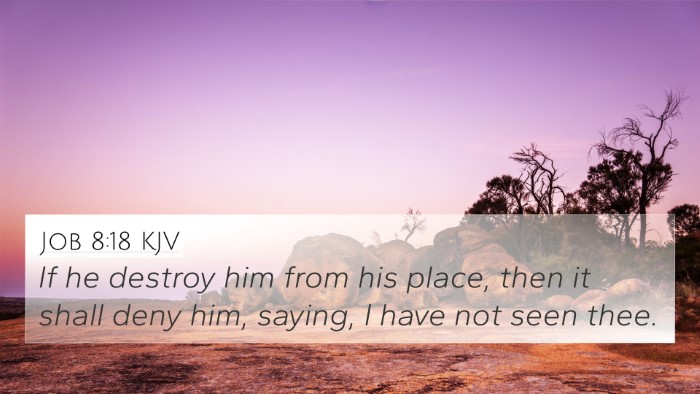
Job 8:18 (KJV) »
If he destroy him from his place, then it shall deny him, saying, I have not seen thee.
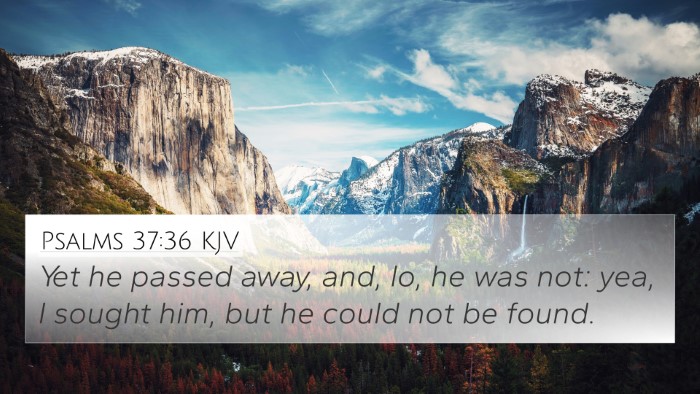
Psalms 37:36 (KJV) »
Yet he passed away, and, lo, he was not: yea, I sought him, but he could not be found.

Psalms 37:10 (KJV) »
For yet a little while, and the wicked shall not be: yea, thou shalt diligently consider his place, and it shall not be.
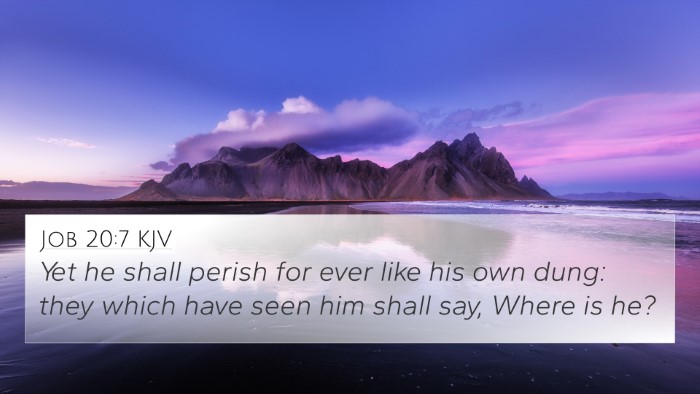
Job 20:7 (KJV) »
Yet he shall perish for ever like his own dung: they which have seen him shall say, Where is he?
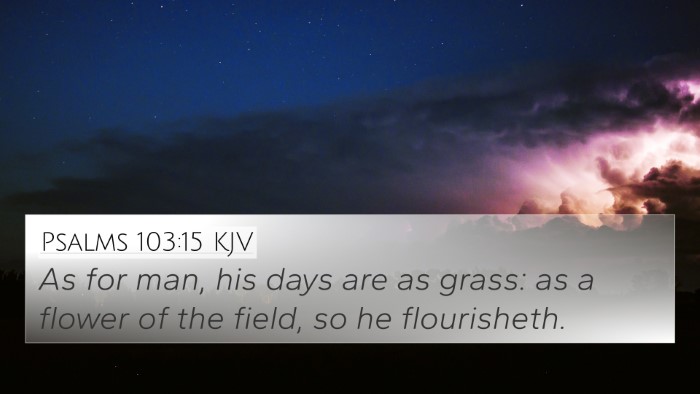
Psalms 103:15 (KJV) »
As for man, his days are as grass: as a flower of the field, so he flourisheth.
Job 20:9 Verse Analysis and Similar Verses
Understanding Job 20:9
Job 20:9 states: "The eye which saw him shall see him no more; neither shall his place any more behold him." This verse describes the transient nature of life and the ultimate fate that awaits the wicked.
Summary of the Verse Meaning
This verse provides a powerful commentary on the fate of the wicked and serves as a reminder of the limited time evil people can enjoy their ill-gotten gains. The insights from various public domain commentaries such as those by Matthew Henry, Albert Barnes, and Adam Clarke stress the following key points:
- Transitory Nature of Life: The phrase "the eye which saw him shall see him no more" indicates that life is fleeting, and those who thrive in wickedness will eventually be forgotten.
- Ultimate Judgment: Job's friend Zophar is likely addressing the idea that divine justice will prevail, and the fate of the evildoer is sealed. The absence of remembrance implies divine retribution.
- Divine Retribution: Both Henry and Barnes emphasize that God, in His fairness, ensures that the unrepentant are not allowed a lasting legacy. The “place” of the wicked is stripped away.
- Contrast with the Righteous: While the wicked fade from memory, the righteous are regarded favorably and their deeds endure through generations (Proverbs 10:7).
- Foreshadowing of Final Judgment: This verse foreshadows the eventual fate awaiting those who defy God, which includes separation from His presence (Revelation 20:15).
Bible Cross-References
Below are some significant Bible verses that relate to Job 20:9, reinforcing its themes of the destiny of the wicked:
- Psalm 37:10: "For yet a little while, and the wicked shall not be: yea, thou shalt diligently consider his place, and it shall not be." This echoes the same sentiment of the elimination of the wicked.
- Proverbs 24:20: "For there shall be no reward to the evil man; the candle of the wicked shall be put out." Again highlighting the fate of evil deeds.
- Isaiah 57:1-2: "The righteous perisheth, and no man layeth it to heart: and merciful men are taken away, none considering that the righteous is taken away from the evil to come." Suggests the protection and reward of the righteous.
- Matthew 7:23: "And then will I profess unto them, I never knew you: depart from me, ye that work iniquity." This illustrates the rejection of those who practice wickedness.
- Lamentations 3:34-36: "To crush under his feet all the prisoners of the earth, to turn aside the right of a man before the face of the most High, to subvert a man in his cause, the Lord approveth not." Focusing on God's view of injustice.
- Philippians 3:19: "Whose end is destruction, whose God is their belly, and whose glory is in their shame, who mind earthly things." Describing the eventual fate of those consumed by worldly desires.
- 2 Peter 2:9: "The Lord knoweth how to deliver the godly out of temptations, and to reserve the unjust unto the day of judgment to be punished." Emphasizing God's justice and timing.
Thematic Connections and Comparative Analysis
The study of Job 20:9 invites deeper examination of the overarching biblical themes of justice, mortality, and divine retribution. Here are additional thematic connections:
- Connection to Mortality: The references to seeing and being remembered have implications about the brevity of life, as highlighted throughout the scriptures (James 4:14).
- Justice Across Testaments: The consistent theme of God's judgment against evil is found not only in the Old Testament (e.g., Nahum 1:3) but echoed in the New Testament (Matthew 25:46).
- Linking with the Apostle Paul's teachings: In Romans 6:23, Paul states, "For the wages of sin is death," reinforcing the concept that evil living results in dire consequences.
- Inter-Biblical Dialogue: The reflections of Job's plight connect to the suffering servant themes found in Isaiah, showing a continuous dialogue throughout scripture.
Using Cross-References Effectively
Cross-referencing biblical texts enhances understanding and allows for a richer interpretation of scripture. Consider the following tools and methods for effective cross-referencing:
- Bible Concordance: Utilize a good concordance to locate themes, characters, and concepts related to Job 20:9.
- Bible Cross-Reference Guide: Leverage resources that provide thematic links between verses, offering insights into broader narratives.
- Cross-Reference Bible Study Tools: Engage with platforms that allow for interactivity with texts while exploring connections and deeper meanings.
- Application for Sermon Preparation: Pastors can utilize cross-references to formulate cohesive messages that address the themes like judgment and righteousness.
Conclusion
Job 20:9 serves as a sober reminder of the fate of the wicked and the transient nature of life. By utilizing various commentaries, thematic analysis, and effective cross-referencing techniques, readers can gain a substantial understanding of this verse and its implications for both personal faith and the broader biblical narrative.
